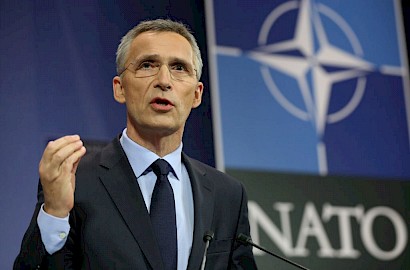NATO chief: Melting Arctic ice could heat up geopolitics
 With China and Russia expanding their military presence in the Arctic, NATO Secretary-General Jens Stoltenberg told DW melting ice could increase geopolitical tensions and show the “security impacts of climate change.”
With China and Russia expanding their military presence in the Arctic, NATO Secretary-General Jens Stoltenberg told DW melting ice could increase geopolitical tensions and show the “security impacts of climate change.”
“The melting of the ice in the Arctic could lead to the heating up of geopolitical tensions between different powers in the world,” Secretary-General Jens Stoltenberg told DW’s Alexandra von Nahmen in an exclusive interview ahead of an in-person meeting of NATO foreign ministers.
“We have seen the increased military presence of Russia,” Stoltenberg said when asked about concerns over a new cold war in the Arctic. “They’re opening up Soviet military facilities in the Arctic,” he added.
“We also see an increased Chinese presence,” Stoltenberg said. In 2018, China declared itself a “near-Arctic” nation. He added that melting Arctic ice was already “changing the security landscape.”
“For me, this demonstrates the security impacts of climate change,” Stoltenberg said. “We need to engage with China on many issues, including climate change,” he added. “At the same time, the rise of China also poses some serious challenges.”
‘Rising power’ China
Though NATO does not have a single unified strategy, Stoltenberg said, members are developing “more and more a common position on how to deal with China within the NATO alliance.”
Stoltenberg said: “China is a rising power … a power that doesn’t share our values. You can see that in the way they behave in Hong Kong, how they suppress opposition in their own country, but also the way they are undermining the rules-based order.”
“China is coming closer to us, investing in our critical infrastructure,” Stoltenberg said. “There’s no way we can avoid addressing the security consequences for our regional alliance of the rise of China the shift in the global balance of power.”
New trans-Atlantic chapter
NATO foreign ministers are due to meet in person in Brussels this week for the first time since the coronavirus pandemic was declared. US Secretary of State Antony Blinken is expected to join the two-day meeting in what has been viewed as a show of support for the NATO alliance.
“We have now a unique opportunity to open a new chapter in the relationship between North America — the United States — and Europe,” Stoltenberg said.
The Biden administration has shown a commitment “to trans-Atlantic unity,” he added.
Asked what message he expected from Blinken on the potential withdrawal of US troops from Afghanistan, Stoltenberg said: “We have to remember that the majority of the troops in Afghanistan now are coming from European allied countries and partner nations.”
“No final decision has been made on our military presence, but we went into Afghanistan together,” Stoltenberg said. “When the time is right, we will also leave Afghanistan together, and Germany is playing a key role being one of the leading nations in Afghanistan.”
You can return to the main Market News page, or press the Back button on your browser.

